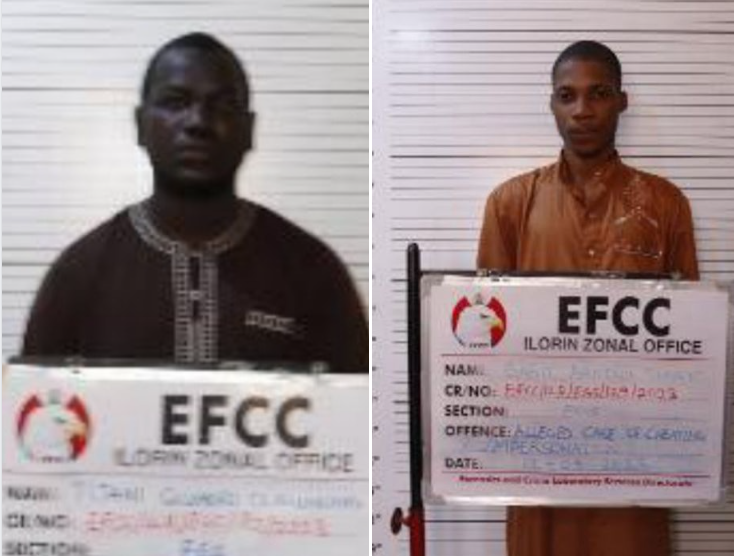Metro
Court jails two Yahoo Boys for N22 million fraud in Ilorin

The Ilorin Zonal Command of the Economic and Financial Crimes Commission, EFCC on Monday, November 6, 2023 secured the conviction and sentencing of Tijani Quadri Olasunkanmi and Soneye Basit Abiodun before Justice Adebayo Yusuf of the Federal High Court sitting in Ilorin, Kwara State.
They were jailed after pleading guilty to one- count separate charge, bordering on internet fraud, brought against them by the EFCC.
One of the count charges reads:
“That you, Tijani Quadri Olasunkanmi between January, 2022 and December, 2022 in Ilorin, Kwara State within the jurisdiction of this Honourable Court did knowingly had under your control the sum of N21,862,800.00 (Twenty one Million, Eight Hundred Sixty Two Thousand, Eight Hundred Naira) only in your bank account number: 2115320752 with the name: Tijani Quadri Olasunkanmi domiciled with the United Bank of Africa which you knew to be proceeds of crime and thereby committed an offence contrary to and punishable under Section 319(a) of the Penal Code Laws of Northern Nigerian”.
The defendants pleaded guilty to the charges when they were read to them.
In view of their pleas, prosecution counsel, Isabel Adeniran prayed the court to sentence and convict the defendants accordingly.
Justice Yusuf thereafter convicted and sentenced Olasunkanmi to six months imprisonment without an option of fine. He equally forfeited a Lexus RX350 Sports Utility Vehicle, Iphone 14 promax and a MacBook laptop to the Federal Government.
Similarly, the judge convicted and sentenced Abiodun to six months imprisonment with an option of fine of N50,000 (Fifty Thousand Naira Only). He also forfeited an iphone 6+ and the sum of N220,000 (Two Hundred and Twenty Thousand Naira Only) to the Federal Government. Additionally, the convict was ordered to restitute the sum of $180 (One Hundred and Eighty Dollars) to his victim.
The convicts began their journey to the Correctional Centre when operatives of the Ilorin Zonal Command of the EFCC arrested them for internet-related offences.
Specifically, they impersonated foreigners and defrauded them in the process.
























